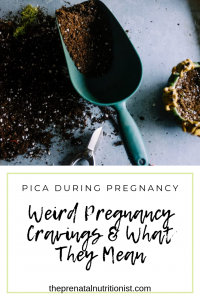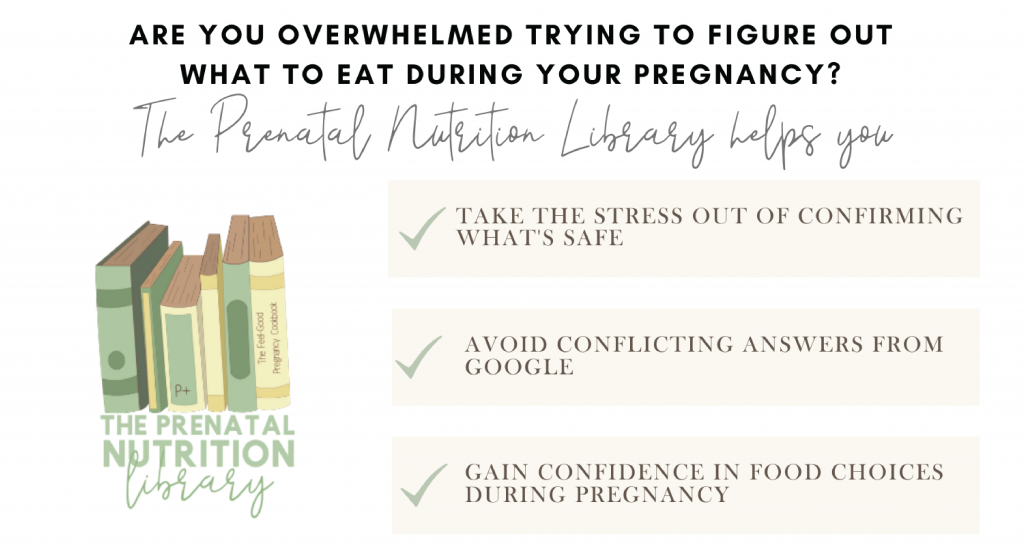 Are you craving NON-FOOD items during your pregnancy?
Are you craving NON-FOOD items during your pregnancy?
We all know that pregnant women experience some pretty weird cravings–pickles and peanut butter, meat and ice cream, pizza dipped in icing… these are just a few on the long list of odd food combos women have experienced! But, what if you are having cravings that aren’t actually food? Don’t worry–you’re not alone! You may be experiencing Pica. We are going to dive into the causes of Pica, and what you may be able to do to combat those funky cravings!
My mom has always told me the story of when she was pregnant with me. It always includes one very specific detail:
“I couldn’t stop eating chalk when I was pregnant with you!”
I always thought maybe my mom was just a weirdo until I discovered it is a very real thing! According to Corbett and Kolasa in their book Nutrition Today: Pica and Weight Gain In Pregnancy, “Pica is considered the craving and deliberate consumption of nonfood substances such as dry laundry starch (amylophagia) or clay (geophagia) or of large quantities of substances such as ice (pagophagia) [over the course of one month or longer]” (2014). Pica is Latin for “Magpie”, a bird noted for eating seemingly anything. If you are craving non-food items during your pregnancy, you may be experiencing Pica.
So, what gives? What would drive a seemingly healthy pregnant woman to eat things like dirt, dish soap, or chalk?
Healthcare professionals and researchers have pinpointed the cause of Pica to various things, one of them including nutritional deficiencies. Optimal prenatal nutrition is also important for healthy gestational weight gain. According to an academic journal published in 2017 by Derrick Johnson and Kathy Gretton, Pica can be caused by deficiencies in vitamins and minerals such as iron, calcium, zinc, vitamin C, and thiamine (2017). Of course, other situations may play a role in Pica. Some cultures view it as a routine part of pregnancy, though Americans usually feel as though it is dangerous for both mom and baby. Some Pica may stem from learned behaviors, trauma, a history of eating disorders, or socio-economic status and lack of access to food. If you are craving non-food items during your pregnancy, be sure to contact your doctor.You may be thinking “Is Pica dangerous? These women can’t be healthy eating dirt! Can they?” This is a very valid question with a vague answer–it depends.
What is it that you’re craving? Is it dirt, chalk, clay, or grass? If so, you’re probably at a lower risk for any sort of toxicity. Bowel blockage would be a definite concern when consuming these items, but they aren’t particularly poisonous. However, there are some cravings that can absolutely be dangerous to both you and your baby. Women have reported craving paint chips, pencil lead, or laundry detergent, which are obviously not made to be consumed, even if all the cool kids these days are eating Tide Pods. If you are craving things like clay, laundry starch, sand, or dirt, you may be anemic and need high iron foods like lentils, eggs, chicken, spinach, or fresh/canned fish. If you are craving chalk, you may be deficient in calcium; for those craving burnt matches, coal, or ashes may be deficient in zinc. So many of the food items these women suffering from Pica crave are rich in various vitamins and minerals! Here are some foods you should include in your prenatal diet.It is very important to talk to your doctor or dietitian if you are having cravings for non-nutritional substances.
Having an open and honest conversation with your doctor will help them accurately diagnose your Pica and allow you to take the next steps to manage your cravings. Being honest and open is incredibly important, even if you feel ashamed of your compulsive cravings or things you have consumed. Your doctor may run some blood work to determine any nutritional deficiencies, which will be a huge help in determining an appropriate plan of care. Remember–you are not alone in this and there is nothing to feel ashamed about…but it’s best to be safe and talk with your doctor, especially if your cravings are for toxic items. After notifying your doctor and receiving blood work, you can work together in adjusting your diet accordingly to fill those gaps and keep the cravings at bay. Ryann made a beautiful post about Pica on Instagram @prenatalnutritionist, which you can see here. ____________________________________________________________________________
 Written by: Kaleigh Eastep, Dietetic Intern
Edited by: Ryann Kipping, RDN, CLEC
References:
Benute, G., Santos, A., Nomura, R., Francisco, R., Santos, N., & Lucia, M. (2016). Pica and Eating Attitudes: A Study of High-Risk Pregnancies. Maternal & Child Health Journal, 20(3), 577–582. https://doi-org.libproxy.lib.ilstu.edu/10.1007/s10995-015-1856-1
Corbett, R. W. & Kolasa, K. M. (2014). Pica and Weight Gain in Pregnancy. Nutrition Today, 49(3), 101–108. doi: 10.1097/NT.0000000000000030.
Johnson, D. (2017). PICA during Pregnancy. International Journal of Childbirth Education, 32(1), 45–47. Retrieved from https://search-ebscohost-com.libproxy.lib.ilstu.edu/login.aspx?direct=true&db=c9h&AN=121029075&site=eds-live&scope=site
Written by: Kaleigh Eastep, Dietetic Intern
Edited by: Ryann Kipping, RDN, CLEC
References:
Benute, G., Santos, A., Nomura, R., Francisco, R., Santos, N., & Lucia, M. (2016). Pica and Eating Attitudes: A Study of High-Risk Pregnancies. Maternal & Child Health Journal, 20(3), 577–582. https://doi-org.libproxy.lib.ilstu.edu/10.1007/s10995-015-1856-1
Corbett, R. W. & Kolasa, K. M. (2014). Pica and Weight Gain in Pregnancy. Nutrition Today, 49(3), 101–108. doi: 10.1097/NT.0000000000000030.
Johnson, D. (2017). PICA during Pregnancy. International Journal of Childbirth Education, 32(1), 45–47. Retrieved from https://search-ebscohost-com.libproxy.lib.ilstu.edu/login.aspx?direct=true&db=c9h&AN=121029075&site=eds-live&scope=site 






